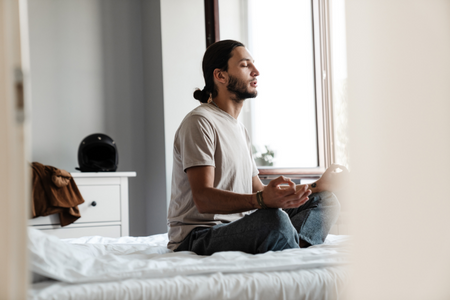Welcome to your MCI Wellbeing Blog for September!
With so much going on in our professional and private lives, it can be difficult to be able to focus when it comes to our studies. In fact, according to researchers at Harvard University, we are lost in thought up to 47% of the time.
Like any other new skill that we try to learn, the key to improving is all about practice, practice practice. The more we practise improving our focusing skills, the better we will become.
Meditation is a really great way to help improve the way we focus. Keep on reading to understand the benefits of meditation, different ways you can practise meditation, as well as some helpful tips and videos!
 The benefits of meditation
The benefits of meditation
Life can be stressful, especially when you feel as if you’re being pulled in different directions. Meditation is a powerful tool to deal with stress and anxiety so that you can take back control and focus on achieving your goals.
Meditation is not a new concept, and with a recent surge of popularity in many celebrities including – Madonna, Hugh Jackman and Oprah (just to name a few) are all regular meditators. Whether you’re juggling your study with - working full-time, or being a stay-at-home parent, meditation can improve all aspects of your life.
Our top five benefits of meditation:
-
1. HELPS YOU STAY FOCUSED
Our favorite benefit from meditation is that your sense of focus will be enhanced. You’ll stay in the present moment instead of quickly going from one task to the next. If your attention span is short, studies show that even a few minutes of meditation can really improve your ability to focus.
-
2. REDUCES STRESS
Meditation can help alleviate stress from any situation you may be in - including your studies! When there is a stressor in our life, we react with an instinct to fight or leave the situation. You may notice your heart racing or a sense of anger that makes you want to be explosive (hence, the need to fight your way out).
When you meditate, you are helping that response from occurring in the first place. Meditation gives you the tools to take a step back, breathe and return to a more relaxed state of mind.

-
3. PROMOTES PRODUCTIVITY
During your study promoting productivity is important. If you meditate daily, you’ll notice a boost in your overall productivity. You’ll be more engaged in your assignments (& everyday tasks) whilst having a new sense of clarity to execute them.
-
4. REGULATES EMOTIONS & MOOD
A regular meditation practice has been shown to improve your overall mood. You’re more in-tune with the way you feel and how you react in any given situation. Meditation influences our physical state to be more relaxed and helps us respond more appropriately to our external world. You’ll have a new understanding and sense of self. You’ll find yourself feeling better and possibly having more energy.
-
5. IMPROVES RELATIONSHIPS
When you meditate regularly, you may notice how you’re more grateful and appreciative towards the people in your life.
Healthy relationships are important not only in personal lives but also professional. You need to feel comfortable sharing your point of view whilst respecting and acknowledging others’ contributions and view’s as well.
Types of meditation
Just in the same way we all work or study in different ways, there are lots of different ways to practise meditation. Try some of the techniques below and see what is the most effective for you!
Focused meditation involves concentration using any of the five senses.
For example, you can focus on something internal, like your breath, or you can bring in external influences (e.g focusing on an object, listening to a sound) to help focus your attention.
This might seem like it would be easy, but if can be difficult to hold your focus for long than a few seconds!
Movement mediation - This is an active form of meditation where movement will guide you into a deeper connection with your body and the present moment.
It’s great for people who’s minds struggle to be still or people that want to develop a better body awareness.
Any types of movement can work, but as a beginner you may want to try something gentle like walking or stretching. You will engage in this mediation by being focusing just on the movement and on how different parts of the body feels as it moves. For example, how do your feet feel against the floor as you walk?
Breathwork meditation - Breathwork is engaging in deep, mindful breathing techniques, focusing only your breath. Breathwork has some incredible benefits including improving concentration and reducing anxiety. See the links below for some great guided breathwork meditations!
Mantra meditation - Mantra meditation is fantastic for people who struggle with silence. It’s all about repeating a word or phrase to increase focus and create a deeper level of awareness. Depending on your work of phrase, it can also be a great motivation or manifestation technique.
You can repeat your ‘mantra’ out loud, or as a thought. After repeating for some time, you should become more alert and in tune with your environment.
 Visualization meditation - Visualization meditation is all about enhancing feelings of relaxation, peace, and calmness by visualizing positive scenes, images, or figures.
Visualization meditation - Visualization meditation is all about enhancing feelings of relaxation, peace, and calmness by visualizing positive scenes, images, or figures.
There are different things you can visualise:
- Imagining a scene vividly and using all five senses to add as much detail as possible.
- Visualising someone you admire and trying to embody their qualities
- Imagining yourself succeeding at specific goals, which is intended to increase focus and motivation.
Many people use visualization meditation to boost their mood and reduce stress levels. It is also a fantastic technique to recenter your focus and remind yourself of your bigger goals.
Guided meditation - Guided meditation is a type of mediation that is led by a teacher. This may be in person or via audio or video. This is a fantastic technique for people starting to explore meditation. There are lots of different types of guided mediations that focus on lots of different topics. See below for some of our favourite guided meditations to help you focus!
Helpful meditation tips
Meditation tips for beginners:
- 1. Start early. Try to meditate first thing in the morning. That way you can be sure that it actually gets done and not bumped off the to-do list as the day gets more hectic. Plus, morning meditation can be a nice way to start the day — you’re refreshed, awake, and on track for a mindful day.
- 2. Same time, same place. If you can’t meditate in the morning, try to make a commitment to meditating at the same time and in the same place every day. Making your practice a regular part of your normal daily routine is key to developing a lasting habit.
- 3. Start small. With three to five minutes (or less), even three minutes can feel like a long time when you first start meditating, so you could even start smaller. Start by paying attention to the sensations of taking three breaths.
Tips for DURING meditation:
Breathe naturally. Meditation does involve focusing on the breath and using it as an anchor for the mind but try not to think about the breath or alter it in any way. Simply allow things to unfold naturally, noticing the rising and falling sensation it creates in the body.
- Get comfortable with discomfort. People who are new to meditation often experience negative emotions like anxiety, restlessness, and irritation whilst meditating. Rather than trying to resist these emotions, give them your full attention and allow them to come and go. Over time the mind learns to recognize these emotions and gets used to not focussing on these negative thoughts. This skill can be very beneficial not only during meditation but also in daily life.
- Take mindfulness with you. Before you finish meditating and go about your day, form a clear idea of what you are going to do next - maybe you’ll start a new assignment, or finally do that dreaded recording. Or even something simpler like taking a shower or making breakfast. Whatever the activity, try to carry the mindfulness you cultivated during your meditation with you into the next task and throughout the rest of your day.
Guided meditation videos
Mindfulness Guided Meditation for Focus - YouTube
10 Minute Guided Meditation for Focus - YouTube
Wim Hof Method Guided Breathing for Beginners (3 Rounds Slow Pace) - YouTube
Need assistance as a student at MCI?
Do you require assistance with your studies at MCI? Do you need a role play partner? Be reminded, to please reach out to your mentor. Finally, you always have the option and are encouraged to interact with other students by joining the MCI Student Facebook page.
All the best!
.png?width=113&name=MCIinstitute_RGB_Color_Black-01%20(2).png)




